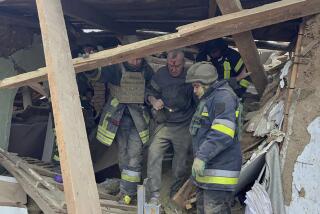Missiles Shake Kuwaitis From Complacency
- Share via
KUWAIT CITY — At least five Iraqi missiles were fired over Kuwait on Thursday, military officials said, and the wailing of air raid sirens and the sight of citizens scrambling for shelter dampened the bravado many Kuwaitis had felt just a few hours earlier.
Some of the missiles were shot down and others fell harmlessly in the desert, but the attacks unnerved many Kuwaitis.
“We thought it would all be easy,” said Hamad Mohana, 45, an engineer on his way to a mosque. “It doesn’t look quite like that anymore.”
Throughout the course of Thursday, the mood fluctuated with each turn of events.
The day started with near-giddy anticipation after President Bush announced the first strikes on Kuwait’s arch-nemesis, Iraqi leader Saddam Hussein, in the wee hours.
At a coffeehouse south of downtown Kuwait City, a cheer erupted from customers watching grainy televised images of the first missile assault on Baghdad. “This is the day Kuwaitis have been dreaming of for more than 12 years,” said Khaled Sharrah, manager at an export-import company. “This is the day Saddam will be gone. Every Kuwaiti has a reason to celebrate.”
Just a few hours later, however, the government’s bland civil defense warnings became all too real as Kuwaitis found themselves scurrying into basements and shelters in response to warning sirens -- staccato tones for danger and a continuous blare signaling the all-clear -- as radio and television broadcast news of the Iraqi missile firings.
“We thought the American and Kuwaiti armies would protect us completely,” said Adel Ali, 39, a civil engineer, recounting how a friend called him from the north immediately after watching an Iraqi missile fly over his head only to see it hit by three Patriot missiles. “Now this happens, and it’s only the first day,” Ali said. “It’s a bit daunting.”
As such talk spread through the city, many feared more missiles were on the way, perhaps next time tipped with chemical or biological weapons. “The whole scene is a bad flashback for many people,” said Kamal Amoori, a reporter for one of the state-run television stations here, referring to the August 1990 Iraqi invasion of Kuwait.
Kuwaitis said it wasn’t surprising that they had become Hussein’s first target, given their decision to play host to the U.S. forces and the strongman’s resentment that Kuwait regained its independence in the 1991 Persian Gulf War.
Nabeel Luaqut, a high school physical education teacher, said he remained fairly confident that Hussein was on the way out. “But he could go out with a big bang,” Luaqut said, “aimed directly at us.”
In the heart of Kuwait City’s old souk, or traditional marketplace, the United Gulf Currency money-changing shop was thriving with business as anxious guest workers crowded around the smeared glass counter to buy dollars and euros.
“I’m trying to go back to Bangladesh,” said Shafiq Islam, 29, a restaurant worker, clutching a fist of $20 bills. “I’m a bit scared.”
Checkpoints sprang up throughout the city, including several across major highways, blocking traffic for half a mile or more. Kuwaitis generally remained calm despite their fears, but there was some stockpiling of food and other necessities as the Education Ministry announced that school was suspended for a week.
“There’s a war going on,” said civil engineer Khalid Hilal Otabi, pushing a cart filled with six loaves of bread at a supermarket in the city’s Shamiyah District. “We’re taking precautions, buying some extra food, fitting out our room with duct tape, radios and water. Our kids are delighted, though, to be out of classes for several days.”
Many people stayed indoors throughout the afternoon as streets, ordinarily busy on the first day of the Kuwaiti weekend akin to an American Saturday, were deserted. By evening, however, some of the swagger seemed to have returned as television broadcast images of a sustained assault by coalition forces on Baghdad and the southern part of Iraq.
“Kuwaitis are delighted,” said Hisham bin Ghaith, a 47-year-old retired government worker, as he sat against a wall sipping tea with his friends. “Iraq invaded our country on a Thursday, and America started its attack on Iraq on a Thursday. God willing, Saddam Hussein will be captured by next Thursday.”
“He can’t do much of anything now,” added Anas Marzouk, a retired officer in the police ministry. “There’s really only one thing left for him to do.” And at this Marzouk put his index finger to his temple, pantomiming Hussein’s suicide.
More to Read
Sign up for Essential California
The most important California stories and recommendations in your inbox every morning.
You may occasionally receive promotional content from the Los Angeles Times.










